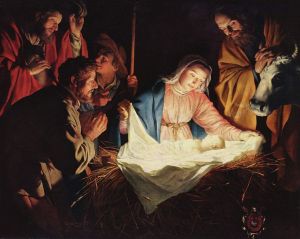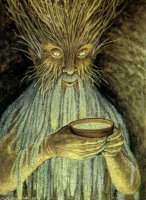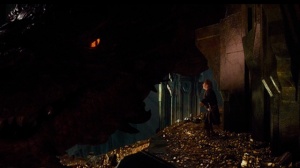Let us pause before the Child of Bethlehem. Let us allow our hearts to be touched, let us not fear this. Let us not fear that our hearts be moved. We need this! Let us allow ourselves to be warmed by the tenderness of God; we need his caress. God’s caresses do not harm us. They give us peace and strength. We need his caresses. God is full of love: to him be praise and glory forever! God is peace: let us ask him to help us to be peacemakers each day, in our life, in our families, in our cities and nations, in the whole world. Let us allow ourselves to be moved by God’s goodness.
Archive for December, 2013
Quote of the Day, 12/30/13
Posted in Catholicism, Christianity, Current Events, God, Holidays, Quotes on December 31, 2013| Leave a Comment »
Back to ‘Home Alone’; or Why it Matters that it’s Kevin’s House
Posted in Art, Catholicism, Christianity, Classics, Family, God, Holidays, Jesus Christ, Movies, Religion, tagged Christmas, Christmas Movies, Daniel Stern, Home Alone, Joe Pesci, Kevin McCallister, Macaulay Culkin, Wet Bandits on December 28, 2013| Leave a Comment »
 The reason the scenario of “Home Alone” is so funny is that it is a joke.
The reason the scenario of “Home Alone” is so funny is that it is a joke.
A joke, at root, is the juxtaposition of incongruous elements, often to humorous effect. In this case, the joke is on the Wet Bandits, two full-grown, mean burglars who are outwitted and banged up by a little 8-year-old boy.
How, precisely, does this unlikely turn of affairs happen? How is Kevin McCallister (Macaulay Culkin) able to outsmart his formidable burgling foes?
At the risk of oversimplifying, I’ll suggest that it’s because Kevin knows his own house. Moreover, he knows how to use it against the intruders who want to plunder it.
 Burglars Harry (Joe Pesci) and Marv (Daniel Stern), on the other hand, are coming into this situation with a decided disadvantage. Not only are they coming into what is not their own, they are also “zeroing in” on what they can use for their own purposes. So their eyes are going to be on things like how to get into the house (Marv is an expert lock-picker) and on what they want to take with them when they leave (jewelry, etc).
Burglars Harry (Joe Pesci) and Marv (Daniel Stern), on the other hand, are coming into this situation with a decided disadvantage. Not only are they coming into what is not their own, they are also “zeroing in” on what they can use for their own purposes. So their eyes are going to be on things like how to get into the house (Marv is an expert lock-picker) and on what they want to take with them when they leave (jewelry, etc).
 Kevin’s vantage point comes from being at home within the house, so his perspective is one of belonging, of “placed-ness.”
Kevin’s vantage point comes from being at home within the house, so his perspective is one of belonging, of “placed-ness.”
Use is not bad in itself — it’s even necessary in many cases. It is when use becomes the governing principle of our lives and relations that we get into trouble, because then questions of right and wrong become subject to questions of usefulness.
 And that’s where the spiritual analogy comes in. The world and humanity have their own “Harry and Marv” — namely, the devil and his rebel angels (a.k.a. demons). The Satanic attitude toward the world can only be one of use — of appropriating persons, places, and things for egotistical and power-hungry purposes. This is even — perhaps especially — the case when use means destruction.
And that’s where the spiritual analogy comes in. The world and humanity have their own “Harry and Marv” — namely, the devil and his rebel angels (a.k.a. demons). The Satanic attitude toward the world can only be one of use — of appropriating persons, places, and things for egotistical and power-hungry purposes. This is even — perhaps especially — the case when use means destruction.
 Lucky, we also have a Kevin. As the Eternal Word (Logos), Jesus Christ knows His own universe inside and out. Yet He doesn’t stop there. He comes to “pitch His tent among us” (John 1:14), becoming at-home with us. He outsmarts the devil as a sort of small child (literally, upon first entering the world), turning him away as surely as Kevin McCallister turns away the Wet Bandits.
Lucky, we also have a Kevin. As the Eternal Word (Logos), Jesus Christ knows His own universe inside and out. Yet He doesn’t stop there. He comes to “pitch His tent among us” (John 1:14), becoming at-home with us. He outsmarts the devil as a sort of small child (literally, upon first entering the world), turning him away as surely as Kevin McCallister turns away the Wet Bandits.
When a strong man fully armed guards his palace, his possessions are safe. But when one stronger than he attacks and overcomes him, he takes away the armor on which he relied and distributes the spoils. (Luke 11: 21-22)
Let’s walk briefly through Kevin’s creative uses of house materials against the Wet Bandits, some of which are foreshadowed early in the film. At the beginning, Kevin’s dad tells him to “pick up those Micro Machines…Aunt Leslie slipped on one of them and almost broke her neck.” Fans will recall that he later disperses these Micro Machines at the base of stairway, causing Harry and Marv to go flying.
 Kevin’s brother, Buzz, has a pet tarantula. Kevin will later use him to scare off Marv when the latter gets a hold of his ankle.
Kevin’s brother, Buzz, has a pet tarantula. Kevin will later use him to scare off Marv when the latter gets a hold of his ankle.
I could go on and on, from Kevin’s use of irons, Christmas tree ornaments, paint cans, etc. But I think you get the point.
Finally, how does Jesus Christ use His “household materials” to outwit the devil? Again, we’ll just run through a few examples:
- Water – used to take our children out of the devil’s hands in Baptism
- Bread and wine — As a Catholic, I believe in the doctrine according to which He gives the priest power to turn these into His very Body and Blood in the Mass
- Suffering — Christ can use this to bring us closer to Him
And of course there are many other things in our material world and everyday lives that He makes use of for our salvation, sanctification, and edification (this topic deserves a whole separate post; maybe I’ll do one in the future). In all cases, we can afford to laugh a bit at the “burglars” who are flipped onto their heads and made fools of, and to smile at the Clever Child Who outsmarts them in defense of what is His own.
I didn’t realize until just now that it is one year to the day that I posted “‘Home Alone’ Redux.” Time flies, doesn’t it? Thanks for reading!
All “Home Alone” images obtained through a Google image search; remaining images from Wikipedia
Article — ‘Long Lines and Other Christmas Hardships: Gifts from Above?’
Posted in Catholicism, Christianity, Holidays, Other, Religion, Spirituality, tagged Christmas, Patience, Prayer on December 24, 2013| Leave a Comment »
 Another great article from Catholic Lane. Not sure who’s going to read this on Christmas Eve…but hey, no harm no foul.
Another great article from Catholic Lane. Not sure who’s going to read this on Christmas Eve…but hey, no harm no foul.
Here’s the link, if you want to read it — it’s short and, in this blogger’s humble opinion, well worth your time:
“Long Lines and Other Christmas Hardships: Gifts from Above?”
Image from Wikipedia
Why Christmas is a Good Time for Hobbits
Posted in Art, Books, Christianity, Classics, Fantasy, Holidays, Jesus Christ, Lord of the Rings, Movies, Reading, Religion, tagged C.S. Lewis, Christmas, Hobbits, J.R.R. Tolkien, Middle Earth, Nativity, The Hobbit on December 24, 2013| Leave a Comment »
Okay, okay…let’s start with a concession: This is a big time of year for the premiere of all kinds of movies. But as a viewer, I have always felt it strangely appropriate that all three “Lord of the Rings” films came out at Christmastime. And now the “Hobbit” films are coming out during the holiday season as well. Somehow, it just feels right.
And maybe it’s providential…if for no other reason, because of the Hobbits.
 There is an interesting scene in “The Two Towers,” the second book in Tolkien’s “Rings” trilogy, in which Hobbits Merry and Pippin tell Treebeard the story of their journey. Here is Treebeard’s response:
There is an interesting scene in “The Two Towers,” the second book in Tolkien’s “Rings” trilogy, in which Hobbits Merry and Pippin tell Treebeard the story of their journey. Here is Treebeard’s response:
There is something very big going on … By root and twig, but it is a strange business: up sprout a little folk that are not in the old lists (of creatures), and behold! the Nine forgotten Riders reappear to hunt them, and Gandalf takes them on a great journey, and Galadriel harbours them in Caras Galadon, and Orcs pursue them down all the leagues of Wilderland: indeed they seem to be caught up in a great storm. (‘The Two Towers,” Book III, Chapter 4 — bold mine)
I highlighted the bold section for a reason. With “little people” appearing during the Third Age of Middle Earth, Tolkien’s Christianity seems to be peeping through the rafters.
 One of the best commentaries on Christmas comes from C.S. Lewis, who said — I believe in “Mere Christianity” — that Christ’s coming into the world as an infant, born into poverty at that, was a deeply subversive act. Coming to reclaim mankind and the world and to free them from the tyrannical power of the devil, he had to slip into enemy territory — behind enemy lines, as it were — unseen.
One of the best commentaries on Christmas comes from C.S. Lewis, who said — I believe in “Mere Christianity” — that Christ’s coming into the world as an infant, born into poverty at that, was a deeply subversive act. Coming to reclaim mankind and the world and to free them from the tyrannical power of the devil, he had to slip into enemy territory — behind enemy lines, as it were — unseen.
And, like the Hobbits, Christ was pursued by those seeking His death from the moment of His birth. Those familiar with the New Testament will recall the slaughter of the innocents and the Holy Family’s flight into Egypt.
The Third Age of Middle Earth, unbeknownst to its inhabitants, would witness cataclysmic events that would decide the fate of the world. Against the threat of Sauron, the Dark Lord, the might of Men and Elves would not avail.
Perceiving the oncoming storm, Gandalf the Wizard intuits that Middle Earth will need the help of a people with a whole new “skill set.” Hence, he gets the Hobbits involved.
 Whether it is Bilbo Baggins slipping into the dragon Smaug’s lair as a “burglar” or Frodo and Sam slipping into Mordor, the Hobbits are perfect “weapons” by virtue of their smallness and ability to creep into enemy territory unnoticed. In this way, they are able to overthrow the usurpers that possess, or seek to possess, what is not theirs.
Whether it is Bilbo Baggins slipping into the dragon Smaug’s lair as a “burglar” or Frodo and Sam slipping into Mordor, the Hobbits are perfect “weapons” by virtue of their smallness and ability to creep into enemy territory unnoticed. In this way, they are able to overthrow the usurpers that possess, or seek to possess, what is not theirs.
As we approach Christmas Day, let us celebrate Hobbits…and the birth of the Little King Who slips into the lair to defeat our Smaug.
Images of Treebeard and the Nativity from Wikipedia; others obtained through a Google image search
On the Ghost of Christmas Past — Part Two
Posted in Art, Books, Christianity, Classics, Fantasy, God, Holidays, Philosophy, Reading, Religion, Spirituality, tagged A Christmas Carol, Charles Dickens, Christmas, Ebenezer Scrooge, Ghost of Christmas Past, Guilt, Healing, Redemption on December 21, 2013| Leave a Comment »
 Fans of “A Christmas Carol” will remember that Scrooge is bothered by the light that the Ghost of Christmas Past brings, and asks that the spirit place the cap it carries on its head to diminish it.
Fans of “A Christmas Carol” will remember that Scrooge is bothered by the light that the Ghost of Christmas Past brings, and asks that the spirit place the cap it carries on its head to diminish it.
“What(?)” exclaimed the Ghost, “would you so soon put out, with worldly hands, the light I give? Is it not enough that you are one of those whose passions made this cap, and force me through whole trains of years to wear it low upon my brow!” (A Christmas Carol, Stave II)
What Dickens’ specific religious persuasion was I’m not sure, but I can’t help but think he might have been influenced, at least in part, by Christ’s words in John’s Gospel:
And this is the verdict, that the light came into the world, but people preferred darkness to light, because their works were evil. For everyone who does wicked things hates the light and does not come toward the light, so that his works might not be exposed. (John 3: 19-20 — bold mine)
Besides being linked to the mystery of time, the past is also a judgement. How many of us cringe at the memory of past faults, whether serious or trivial? How often do past embarrassments creep into our minds, causing us to blush?
The thing about the past is that it is set in stone. It cannot be changed. The past can be forgiven, but not erased. A person can be redeemed and changed, but past actions cannot be turned into past non-actions. The train of effects set in motion by a particular action can be arrested and fixed, but the action itself cannot be undone.
In Scrooge’s case, as well as in ours often enough, to confront the past is to face the forgotten, the wrong turn(s) that led to current problems.
Scrooge’s journey into his own past uncovers much that has been repressed — childhood loneliness, among other things. Most significant, however, is a matter of guilt. We learn that he was engaged to a woman named Belle, whom he spurned for the idol of money.
Ultimately, Scrooge’s miserly accumulation of wealth and the psychological distance he puts between himself and humanity are forms of protection against his own past — just as humanity’s wars, factions, attachments, etc. protect us against the memory of the Fall.
We can probably assume that the sequential location of the past among the three modes of time is not the only reason for the Ghost of Christmas Past having the first spot in Scrooge’s journey of redemption. Oftentimes, it is in facing the past, acknowledging the problems that lie hidden, that we get the ball rolling on the healing process (after all, how are we going to know how to heal if we don’t even know what to heal?).
That is one of Christianity’s greatest secrets. In Genesis, we have the revelation of both our origin — God’s all-loving creation of the world out of nothing, culminating in the creation of mankind, with whom He desires fellowship — and our root problem — mankind’s disobedience to and estrangement from his Creator and Father.
When we turn to God and acknowledge this, as well as our own individual sins, then we can begin to heal. Not only that, but God Himself comes down to us to get everything started, before we even take our first steps. That’s the real Christmas present.
Image from Wikipedia
On the Ghost of Christmas Past — Part One
Posted in Art, Books, Christianity, Classics, Fantasy, God, Holidays, Jesus Christ, Philosophy, Reading, Religion, tagged A Christmas Carol, Charles Dickens, Eternity, Ghost of Christmas Past, Literature, Time on December 19, 2013| Leave a Comment »
 This is a follow-up to my post of Youtuber Brett Fawcett’s reflections on Charles Dickens’ “A Christmas Carol” last week.
This is a follow-up to my post of Youtuber Brett Fawcett’s reflections on Charles Dickens’ “A Christmas Carol” last week.
Brett’s video is excellent, in this blogger’s humble opinion — but he did neglect to offer any reflections on the Ghost of Christmas Past, so I thought I’d take the opportunity to fill in the gap.
It’s interesting how many faces this particular specter has had in the story’s various adaptations, ranging from a little girl in “The Muppet Christmas Carol” to an elderly man in the Alastair Sim version. To be sure, this is arguably the hardest of Dickens’ ghosts to get a handle on, yet at the same time the one that presents the most options for creativity.
When I finally read Dickens’ unabridged classic at age 13, I was taken by the Ghost of Christmas Past’s very ethereal and otherworldly character. Dickens’ description offers a vision of one who is neither male nor female, and yet has the qualities of both; neither old nor young, yet both indescribably ancient and yet young with a youth that could rejuvenate the dawn.
Here is my take: Whereas the Ghost of Christmas Present represents, as Fawcett said, “Father Christmas” — or the “Christmas spirit” — and the Ghost of Christmas Yet to Come represents the “angel of death,” the Ghost of Christmas Past represents the mystery of time.
I would suggest that it is the past, more than either of the other modes of time, that makes us aware of this mystery. What is peculiar about the past is that it has actuality, but not the immediate accessibility of the present. So it’s going to take on a more mysterious quality for us.
But there is something else as well. We live always in the present, to be sure. But the more aware we become of ourselves (growing from infancy to maturity), the more aware we become of our present and our past. We become aware of events and realities that, in various ways, contribute to and influence the present situation. It seems that we first learn this in reference to ourselves, and then eventually to cultures, etc. And from that, we infer that present realities contribute to an as-yet unrealized mode of time — namely, the future. In short, I would suggest (and I’m no philosopher or developmental psychologist, so take my words with a grain of salt) that perhaps our sense of time develops out of our sense of the past.
Finally, our fascination with the mystery of time is largely teleological in nature. In layman’s terms, this means it pertains to our deepest questions about:
- Where we came from;
- Where we’re going; and
- What the meaning of everything is in the meantime
 I will conclude by attempting a very basic summary of how Christians understand time: Time pertains to creation’s movement, under God’s providential guidance, toward the “summing up” of all things in Christ Jesus (Ephesians 1:10). What this will look like in the end, “no eye has seen, nor ear heard, nor the heart of man conceived” (1 Cor. 2:9).
I will conclude by attempting a very basic summary of how Christians understand time: Time pertains to creation’s movement, under God’s providential guidance, toward the “summing up” of all things in Christ Jesus (Ephesians 1:10). What this will look like in the end, “no eye has seen, nor ear heard, nor the heart of man conceived” (1 Cor. 2:9).
This is a destiny that involves the whole cosmos, but also each human being individually. Our story is His story, our time a longing for His eternity.
I’ll look closer at Dickens’ “time-honored” ghost in part two.
Images from Wikipedia
On the Tragedy at Sandy Hook Elementary in Newtown, Connecticut
Posted in Game of Thrones on December 14, 2013| Leave a Comment »
My heart is heavy tonight, and I know I’m not alone. Twenty of my little brothers and sisters, and six of my adult brethren, were killed by a gunman at Sandy Hook Elementary School in Newtown, Connecticut.
I have no words. This is unconscionable, and the fact that this sort of thing has happened before makes it no less so. This, indeed, is the dark side of the great “dance” of which we are all a part.
I flatter myself if I suppose that any of those directly affected by this tragedy will possibly read this post, but on the off-chance that this does happen, let me just say this: I am so very sorry. I know only too well that I cannot offer adequate consolation — just know that I love you, and I love the children who were taken from you. And when I enter into the Presence…
View original post 463 more words
Angry Cat on Christmas Morning
Posted in Art, Holidays, Humor, Memes, Other, tagged angry cat, angry cat meme, Christmas, Really? on December 13, 2013| Leave a Comment »






